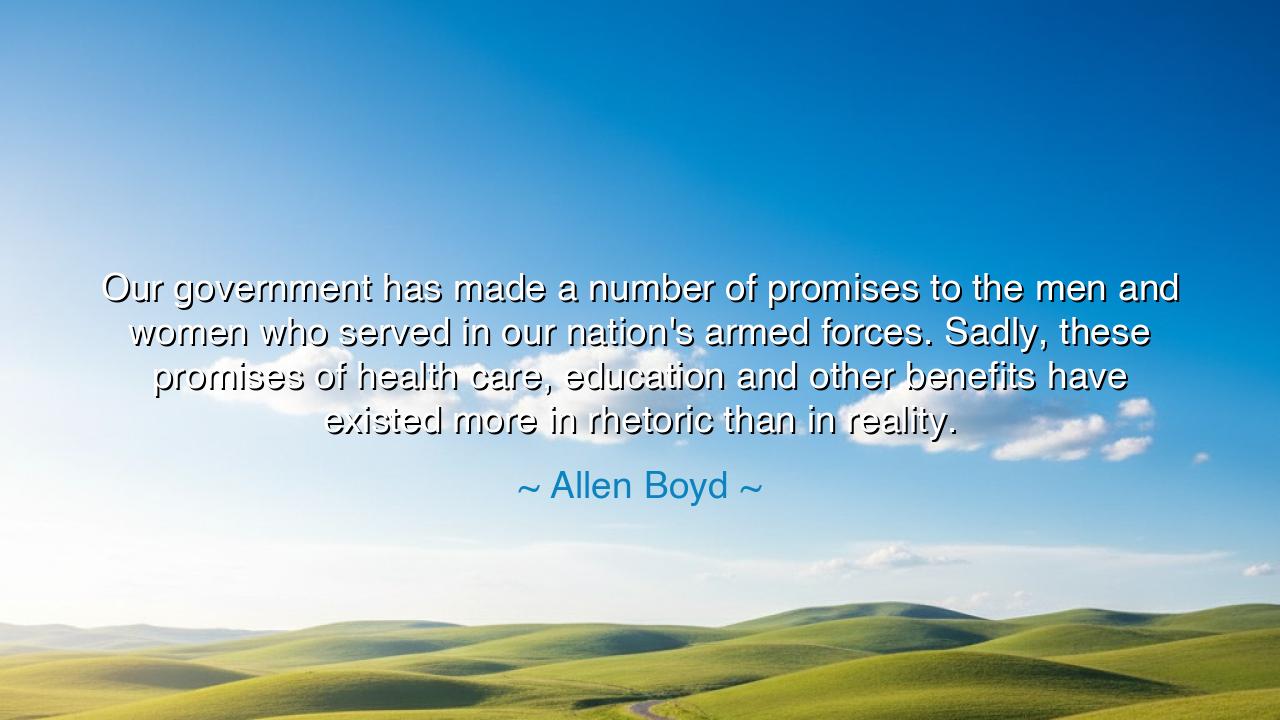
Our government has made a number of promises to the men and women
Our government has made a number of promises to the men and women who served in our nation's armed forces. Sadly, these promises of health care, education and other benefits have existed more in rhetoric than in reality.






“Our government has made a number of promises to the men and women who served in our nation’s armed forces. Sadly, these promises of health care, education and other benefits have existed more in rhetoric than in reality.” Thus spoke Allen Boyd, a soldier turned statesman, whose words carry the solemn weight of duty and betrayal. In them, we hear not the voice of anger, but the ache of conscience—a lament that the nation he served has not fully honored those who bore its burdens. His words are a reminder that promises made in peace must be kept in gratitude, for they are the bonds that tie the living to the sacrifice of those who defended them.
In this truth lies the essence of Boyd’s warning: that words alone cannot repay the debt owed to those who have given their youth, their strength, and sometimes their very lives to the service of their country. When the banners have been folded and the parades have ended, what remains is the quiet struggle of the veteran—seeking healing, education, and stability in a world that has already moved on. To promise care and deliver neglect is to wound the very soul of the republic. For a nation that forgets its defenders forgets itself.
From the dawn of civilization, the pact between warrior and state has been sacred. The ancient Greeks erected monuments to honor their fallen, and the Romans, in their glory, established pensions for soldiers who had served the empire faithfully. They knew that the strength of their armies did not lie only in swords and shields, but in the trust that their people would not abandon them once the battle was done. Yet as the centuries have turned, this sacred bond has too often been broken. Governments have praised the courage of their veterans in speeches, while failing them in life—leaving them to battle poverty, illness, and neglect in the shadow of their own triumphs.
Consider the story of the Bonus Army of 1932. Tens of thousands of American veterans, men who had fought in the First World War, marched on Washington, D.C., to claim the bonuses they had been promised for their service. Hungry and desperate amid the Great Depression, they came not with violence but with dignity, seeking the fulfillment of a debt already long delayed. Yet the government met them not with gratitude, but with force—soldiers driving veterans from their camps, their shelters burned. The sight of those who once wore the uniform being beaten by the very institution they defended remains a stain upon the nation’s conscience. This tragedy, like Boyd’s lament, speaks to the same truth: that rhetoric without action is betrayal in disguise.
Allen Boyd’s words call for a return to integrity—a renewal of the covenant between the people and their protectors. For the promises of health care, education, and benefits are not mere gestures of generosity; they are obligations born from the blood of sacrifice. They are the nation’s repayment for the peace it enjoys and the freedom it preserves. When such promises “exist more in rhetoric than in reality,” the very foundation of trust begins to crumble, and with it, the moral authority of the government itself. True honor does not live in parades or medals, but in deeds—in ensuring that those who fought for justice are not left to suffer in silence.
The ancients would have called such failure a breach of virtue, for in every just society, gratitude is the highest law. The Spartans cared for their wounded heroes as family; the samurai of Japan lived and died by a code that bound the lord to the warrior as much as the warrior to the lord. And yet in the modern age, where bureaucracies reign and promises are made with ease, we have forgotten that duty to one’s defenders is not optional—it is sacred. When leaders speak of “supporting the troops,” they must remember that support is not measured in words, but in wellness, dignity, and opportunity.
So, my child, let this teaching guide you: honor your protectors not with praise alone, but with purpose. Remember that freedom is not free, and gratitude is not fulfilled by ceremony. If you are a citizen, speak for those who once stood for you. Demand that promises made in your name be kept in your nation’s honor. If you are a leader, let your conscience be your compass, and do not rest until justice is done for those who have borne the greatest burden. For as Allen Boyd reminds us, the strength of a nation is not found in its wealth or its armies, but in its faithfulness to those who have served it.
Let this truth endure through generations: that the measure of a country’s greatness lies not in how it wages war, but in how it cares for those who return from it. Only when promises become actions, and gratitude becomes justice, will the spirit of a nation stand unbroken. For words may fade, but deeds endure—and in fulfilling our duty to the brave, we fulfill our highest duty to ourselves.






AAdministratorAdministrator
Welcome, honored guests. Please leave a comment, we will respond soon